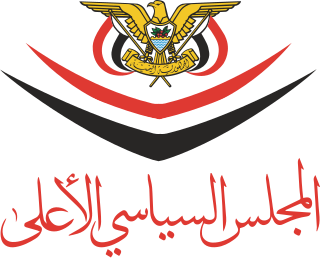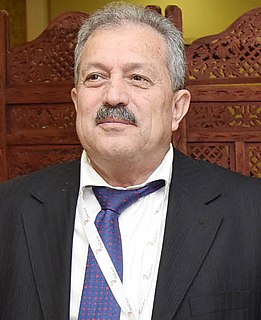Related Research Articles

Ensuring national security, increasing influence among its Arab neighbours and securing the return of the Golan Heights, have been the primary goals of the Syrian Arab Republic's foreign policy. At many points in its history, Syria has seen tension with its neighbours, such as Turkey, Israel, Jordan, Iraq, and Lebanon. Syria enjoyed an improvement in relations with several of the states in its region in the 21st century, prior to the Arab Spring and the Syrian Civil War.

Elections in Syria gives information on elections and election results in Syria.
The National Progressive Front is a political alliance of parties in Syria that supports the Arab nationalist orientation of the government and accepts the "leading role" of the Arab Socialist Ba’ath Party, the largest party in the NPF.

Farouk al-Sharaa is a Syrian politician and diplomat. He is one of the most prominent officials in the Syrian government and served as foreign minister of Syria from 1984 until 2006 when he became Vice President of Syria.

The Cabinet of Syria or Council of Ministers is the chief executive body of the Syrian Arab Republic.

Parliamentary elections were held in Syria on 7 May 2012 to elect the members of the Syrian People's Council. The elections followed the approval of a new constitution in a referendum on 26 February 2012.
Adel Safar is a Syrian politician and academic, who served as Prime Minister of Syria from 14 April 2011 to 23 June 2012. His government was dissolved by Bashar al-Assad as a result of the Syrian parliamentary election in 2012. He was Minister of Agriculture and Agrarian Reform from 2003 to 2011.
International reactions to the Syrian Civil War ranged from support for the government to calls for the government to dissolve. The Arab league, United Nations and Western governments in 2011 quickly condemned the Syrian government's response to the protests which later evolved into the Syrian Civil War as overly heavy-handed and violent. Many Middle Eastern governments initially expressed support for the government and its "security measures", but as the death toll mounted, especially in Hama, they switched to a more balanced approach, criticizing violence from both government and protesters. Russia and China vetoed two attempts at United Nations Security Council sanctions against the Syrian government.

A constitutional referendum was held in Syria on 26 February 2012. In response to the Syrian Civil War, President Bashar al-Assad ordered a new constitution to be drafted. The referendum was not monitored by foreign observers.
This article details responses from Syrian government officials to widespread civil unrest which began in early 2011 and eventually unraveled into nationwide civil war.

Saudi Arabia–Syria relations refer to diplomatic and economic relations between Saudi Arabia and Syria. Diplomatic ties between these two countries of the Middle East have long been strained by the major events in the region. Relations between Saudi Arabia and Syria deteriorated further following the Syrian Civil War and Saudi Arabia's numerous calls for Bashar Assad to be removed from power. Saudi Arabia cut off relations with Syria after they decided to close its embassy in Damascus and expel the Syrian ambassador in 2012.

Presidential elections were held in Syria on 3 June 2014. There is a scholarly consensus that the elections were not democratic. The result was a landslide victory for Bashar al-Assad, who received over 90% of the valid votes. He was sworn in for a third seven-year term on 16 July in the presidential palace in Damascus.

The Supreme Political Council is a largely unrecognised executive body formed by the Houthi movement and the General People's Congress (GPC) to rule Yemen. Formed on 28 July 2016, the presidential council consists of 10 members and was headed by Saleh Ali al-Sammad as president until his death from a drone air strike on 19 April 2018 with Qassem Labozah as vice-president. The territory that it rules consists of the former North Yemen, which united with South Yemen in 1990.

Algeria–Syria relations refers to the relationship between the People's Democratic Republic of Algeria and the Syrian Arab Republic. Algeria has an embassy in Damascus; while Syria has an embassy in Algiers. Both are members of the Arab League. Algeria is one of the few Arab countries that maintains tie with the Syrian Government under Bashar al-Assad, and has defended the government within the Arab League.

Abkhazia–Syria relations refers to the bilateral relationship between the Republic of Abkhazia and Syria. Syria recognised Abkhazia on 29 May 2018. The establishment of relations on an embassy-level was announced very early.

Presidential elections were held in Syria on 26 May 2021, with expatriates able to vote in some embassies abroad on 20 May. The three candidates were incumbent president Bashar al-Assad, Mahmoud Ahmad Marei and Abdullah Sallum Abdullah. The elections occurred under the authoritarian regime of al-Assad and were considered not to be free and fair.

The first government of Hussein Arnous was formed on 30 August 2020 and took the oath of office on 2 September 2020. A new Council of Ministers was formed by Hussein Arnous at the appointment of President Bashar al-Assad. This government was the 94th since Syria gained independence from the Ottoman Empire in 1918 and was the seventh during presidency of President Bashar al-Assad.

The second government of Hussein Arnous was formed after appointment by the President of Syria on 10 August 2021 and took the oath of office on 14 August 2021, after the presidential election held in May. This replaced the caretaker ministry formed in July. The government is the 95th since Syria gained independence from the Ottoman Empire in 1918 and is the eighth during presidency of Bashar al-Assad.
Mohammad Khaled al-Rahmoun is a former military commander, the current Syrian Minister of the Interior.
Kenan Yaghi is a Syrian politician. He has been Finance Minister since 2020.
References
- ↑ "Syrian girl with tumor undergoes surgery in Belarus". belta.by. 25 August 2017. Retrieved 15 November 2017.
- 1 2 "New Syrian Government Formed". syriatimes.sy. Retrieved 15 November 2017.
- ↑ "Al-Qadiri sworn in before President al-Assad". sana.sy. Syrian Arab News Agency. Retrieved 15 November 2017.
- ↑ "Social Affairs Minister meets delegation of Syrian community in Brazil". sana.sy. Syrian Arab News Agency. Retrieved 15 November 2017.
- ↑ "Mashhad Hosts Muslim Nations' Ministers for Women Affairs Meet". Financial Tribune. 29 April 2017. Retrieved 15 November 2017.
- ↑ "Belarusian President suggests working out recuperation program for Syrian children in Belarus". sana.sy. Syrian Arab News Agency. Retrieved 15 November 2017.